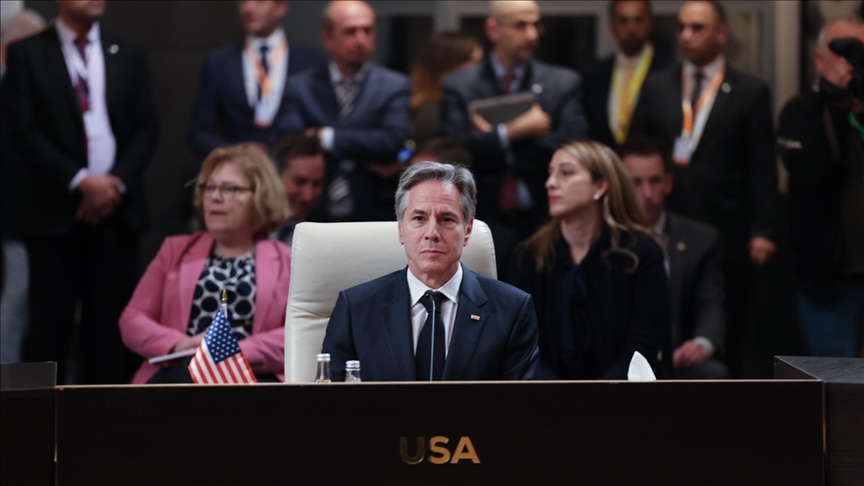US' Blinken refuses to join calls for humanitarian cease-fire, claiming it would give Hamas 'chance to regroup'
In joint press conference with his Jordanian and Egyptian counterparts, Blinken argues time is not suitable for humanitarian cease-fire in Gaza
 US Secretary of State Antony Blinken
US Secretary of State Antony Blinken
ISTANBUL
Rejecting widespread calls for a cease-fire in Gaza, US Secretary of State Antony Blinken on Saturday claimed this would give Hamas a chance to lick its wounds and carry out another attack like the one that began the current conflict.
"A cease-fire now will simply leave Hamas in place, able to regroup and repeat what it did on October 7," Blinken told a joint press conference held in Amman, Jordan with his Jordanian and Egyptian counterparts after meeting with leaders from the United Arab Emirates, Saudi Arabia, Qatar, Egypt, Jordan, and the Palestinian Authority.
He added: "It is important to reaffirm Israel's right to defend itself, and its obligation to do so, and to taking the necessary steps so October 7 never happens again. But what is also important is the way Israel does that, and that's what we talked to the Israeli government about."
The US has reportedly pressed Israel, mostly behind the scenes, to try to defend itself in a more humane way, but to little apparent effect on the ground.
Decrying the mass killings in Gaza, Jordanian Foreign Minister Ayman Safadi called for a cease-fire and argued: "How can we justify to anyone the killing of over 9,000 people, including 4,000 children, in the name of Israel's self-defense?"
He also said: "We demand a cease-fire and reject calling what is happening (in Gaza) self-defense. What is happening cannot be justified and will not bring security to Israel."
Egyptian Foreign Minister Sameh Shoukry said: "We demand an international investigation into the blatant actions seen in the war on Gaza."
He also reiterated his country's rejection of the so-called "liquidation of the Palestinian issue,” meaning an attempt to wipe away the problem in Gaza by forcefully displacing the Palestinians into the Sinai Peninsula.
This week the Israeli army expanded its air and ground attacks on the Gaza Strip, which has been under relentless airstrikes since a surprise offensive by Hamas on Oct. 7.
Nearly 11,000 people have been killed in the conflict, including 9,488 Palestinians and more than 1,538 Israelis.
While continuing its cutoff of electricity, fuel, and water supplies to Gaza, this week Israel let in a trickle of humanitarian aid, but far less than what the strip’s 2.3 million residents need to survive.


